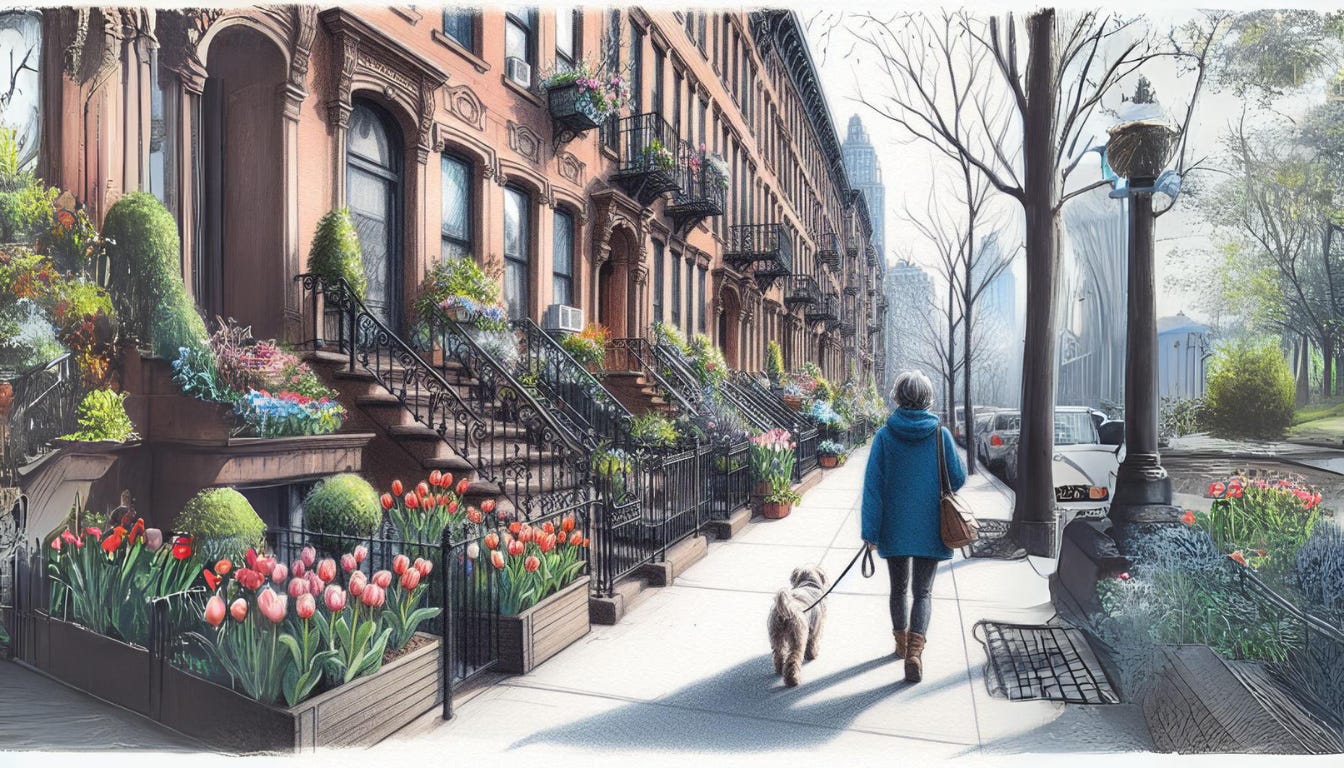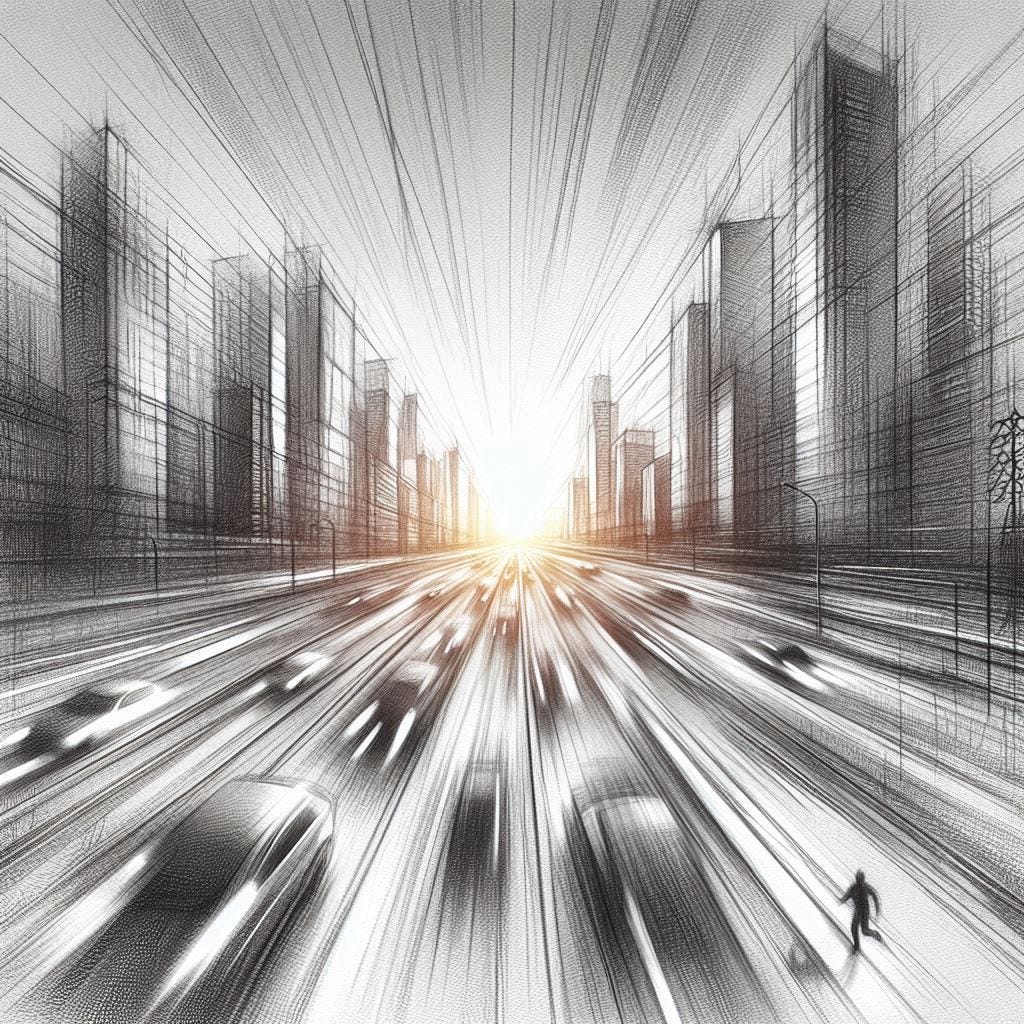Hello. I’m Lou Blaser, and you’re reading We’re All Getting Older, a newsletter about getting better and living our best selves in midlife.
We all have this feeling, I think, that time seems to be moving faster than ever. We look at the calendar and go, “Whoa, it’s June already! How did that happen?! Where did the time go?”
In a recent episode of Second Breaks, my friend Yvonne Marchese and I chatted about this very sentiment, and we identified a few practical steps to help us feel less rushed and more grounded in our daily lives.
Since then, I’ve continued to consider this “issue” — let’s call it that for the sake of this essay. Beyond the sensation of time speeding by, I’ve also been experiencing a peculiar feeling of simply coasting. Not in the sense that life is easy, but more like I’m simply skimming the surface. Everything feels fleeting and transient as if I can’t hold on to enjoy the moments that are rapidly passing by.
Life seems incredibly fast-paced right now.
I recently stumbled upon the work of Hartmut Rosa, a German sociologist, and author of Social Acceleration: A New Theory of Modernity. In his book, Rosa suggests that the rush we feel isn’t just a personal experience but a broader societal trend. He argues that this acceleration is baked into modern life itself, pushing us all to speed up.
The world is moving faster, and the pace of life has indeed sped up. We’re not just imagining it. This is our reality. As a result, we are now trained to expect things to move quickly. And we have extended this expectation to ourselves — and to other people, too — to move faster, decide quicker, respond STAT, complete tasks in less time, commit unequivocally in no time. This constant sense of urgency affects many of us in different ways.
Some, I imagine, initially respond to this urgency like I do — with a burst of adrenaline, excited to take on more projects and expecting more from ourselves. But eventually, we hit a wall or feel anxiety creeping in. Lately, it has felt like I’m in a speeding car, unable to hold on or savor the projects and experiences I’ve chosen and want in my life.
From my earlier conversation with Yvonne, I realize that this feeling is likely a symptom of being too busy, of having too much on our plates.
It’s easy to suggest that the solution is to deliberately slow down, but the real challenge is figuring out how to do that in a world that’s always in a hurry. Can we opt out?
I came up with three initial steps to help me slow down. I’m sharing them with you partly for accountability and partly in case they are helpful to someone in the same situation.
1: De-prioritize certain projects.
Ooof, this is a tough one. Having already done a decent job culling what’s on my plate, I feel that what’s left are projects that are either obligations or things I genuinely want to do. But I have to accept that even this refined list is probably too much for my current capacity.
Leaving corporate life required me to redefine success. Success used to mean more, better, and faster. I’ve had to change that perspective. What I’m finding now, though, is that this isn’t a one-time activity. My ideation of success is deeply rooted, and old expectations often resurface.
I need to redefine success repeatedly for every new project or objective. For instance, it’s one thing to decide that “slow and steady” is my approach to a particular project, but it’s easy to get frustrated when I see others speeding ahead. I need to regularly remind myself that I’m running a different race.
My action item here is to review my current projects and expectations. Do they match my current capacity? Do they need to be completed as quickly as I initially planned? Perhaps I can slow down some of them, extending their timelines. Not everything needs to progress at the same speed. I don’t need to get an A in everything. Maybe getting a B or even a C is good enough for some projects.
2: Be present throughout the day.
I often find myself thinking ahead. While doing something in the morning, part of my brain is already on the tasks scheduled for later, which keeps me from being fully present in the moment.
As Yvonne pointed out, this is likely a symptom of having too much on our to-do lists. We have packed lives, bouncing from one thing to the next to meet our self-imposed schedules. We might choose to do something enjoyable, like taking a morning walk to watch the sunrise, but our minds are so busy with our to-do lists that we miss the experience. It becomes just another task to check off.
I’m committing to paying more attention and to keeping my mind in the present moment throughout the day. This should help me address the feeling that everything is fleeting, that I can’t grasp moments before they’re gone. How can I hold on to a moment when I’m barely there to experience it?
3: Resist the urge to multitask.
Someone recently commented how very busy and noisy it must be in my head. (Absolutely not meant as a compliment!) It’s never just doing the one thing. I’m always doing multiple things simultaneously or flipping between tasks. This habit, developed during my corporate years, was once praised as a valuable skill — “She’s an excellent multi-tasker.”
I’ll refrain from revisiting whether being a multi-tasker actually helped in the past or not. Let’s just say I no longer want to be one, and I’d rather focus on one thing at a time these days. This effort should support my intention to be more present in each moment.
The solution may not be to keep up but to do the opposite.
It’s a safe bet most of us are experiencing this speeding up that Hartmut Rosa speaks of and the resulting sense of urgency. Yet, the solution might not be to frantically keep up with the world’s pace. Instead, it could be the opposite.
Imagine if we dared slow down, resisting the urge to match the frenetic rhythm of modern life. We always have the power to choose how we engage with the world — regardless (or despite) of what it asks of us. We can slow down, even just a little. Cultivate a deeper sense of presence and discover the richness of our days.
Perhaps the secret to having more time isn’t racing against the clock but slowing down enough to appreciate the significance of each moment.








Yes. We need to slow down. Check out Rest is Resistance by Tricia Hersey. Being present in a world of chaos is a form of rebellion, of defiance, of reclaiming the humanity that has been stripped from us.
Happy to report that I am doing all three, albeit not with great results, yet. Hey, at least I am mindful of it, right? :)
I read somewhere that time slows down when one is learning something new, that's why time passed by slower when we were young; when we were kids. As kids, the world is so fascinating and full of unknowns and things to master. So I am working on being a kid again—to learn new things without questioning.